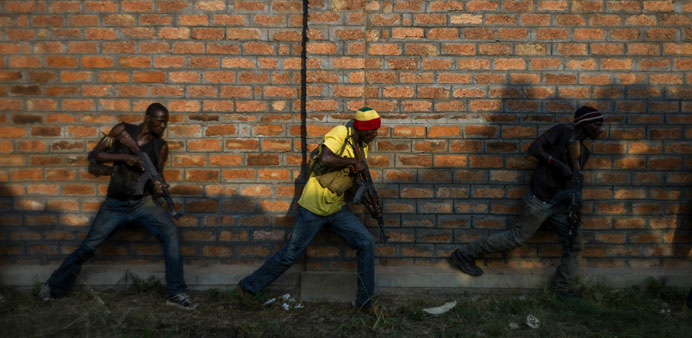|
French troops yesterday took on armed Christian militias in the capital of the Central African Republic, where the UN said 210,000 people had been uprooted in two weeks of deadly sectarian violence. |
Soldiers launched a dawn offensive on a northern district of Bangui known as a stronghold of Christian militias who oppose the Muslim former rebels who seized power earlier this year, their leader said.
Central Africa has spiralled into chaos since a March coup by the mainly Muslim Seleka rebel group overthrew president Francois Bozize, with deadly violence pitting Muslims against Christians.
Faced with reports of widespread atrocities in its former colony, France this month deployed 1,600 troops under a UN mandate to prop up an African peacekeeping force already on the ground.
So far they have focused on disarming the Seleka, but yesterday their commander General Francois Soriano told journalists they were extending operations to disarm militia forces.
“This was an operation to make a district safe,” he said of the offensive in Bangui, where troops had seized weapons and neutralised ammunition.
Several armoured vehicles were deployed on the airport road at the entrance to the district, with a helicopter hovering permanently overhead, an AFP journalist saw.
The CAR is a deeply poor, landlocked nation of 4.6mn with a history of coups, rebellions, army mutinies and civil unrest that has prevented the exploitation of its mineral wealth.
But the latest crisis is the first to take on a sectarian dimension that has roused international fears of mass slaughter.
The UN High Commissioner for Refugees said yesterday that some 210,000 people had been forced from their homes in Bangui since fresh fighting broke out on December 5.
Since the crisis began a year ago, more than 710,000 people have been displaced inside the CAR and over 75,000 have fled across its borders, according to the UNHCR. Seleka forces are accused of committing numerous atrocities, including killings, rape and pillage.
Days before the French intervention, Christian militias loyal to ousted president Francois Bozize launched an attack in the outskirts of Bangui against the Muslims and the clashes claimed about 300 lives, according to the Red Cross.
Christians make up 80% of the troubled country’s population and strongly support the militias, known as “anti-balaka” (“anti-machete” in Sango).
Neutralised and consigned to barracks, many former Seleka fighters have been enraged by what they see as one-sided disarmament, leaving them incapable of defending the Muslim community against the vengeance of Bangui’s mostly Christian population.
Many residents of the capital reproach the French soldiers for generally confining their movements to the major roads and staying out of the dirt streets with countless shacks where looting and lynching by both religious communities still takes place.
‘Unity is our sole wealth’Prime Minister Nicolas Tiangaye, who was in the opposition to Bozize, appealed for calm “so that peace can return”.
“We must safeguard national unity and understanding. This is the foundation of the country. A single country, a single people,” Tiangaye told AFP. “Unity is our sole wealth. Conflicts between communities or between faiths undermine that unity.”
However, divisions have appeared within the government, which is dominated by former Seleka forces but also includes ex-members of the democratic opposition and politicians who backed Bozize.
Michel Djotodia, the country’s first Muslim president and a former Seleka member, has caused a political and constitutional furore by sacking three key government ministers and the director of the state treasury by decree.
France has voiced concern over the move, saying it risked causing more instability in the strife-torn country.
Some 600 people have been killed in the Central African Republic in the last 12 days and two elite French soldiers have died there in a gun battle.
Another 4,000 people—mainly women and children—have crossed the Ubangi river to seek refuge in the neighbouring Democratic Republic of Congo, according to the UN.
France yesterday said other European nations would send troops to the Central African Republic to prop up a military force on the ground attempting to disarm militias dispensing deadly violence.
“We will soon have troops on the ground provided by our European colleagues,” French Foreign Minister Laurent Fabius told the lower house of parliament in Paris, without naming the countries.
In Brussels, a Belgian military source told AFP that the government was considering the dispatch of some 150 troops for “a protection mission”.
The source, who asked not to be identified, said the troops might be deployed to secure airports, including in Bangui.
The Spanish government, meanwhile, has okayed plans to send a Hercules military transport aircraft with a “maintenance and support unit” of up to 60 personnel, which will apparently go to parliament for approval today. But it is not likely to include combat troops.
It is as yet unclear whether other countries will also be assisting France on the ground, other than providing logistical help.

